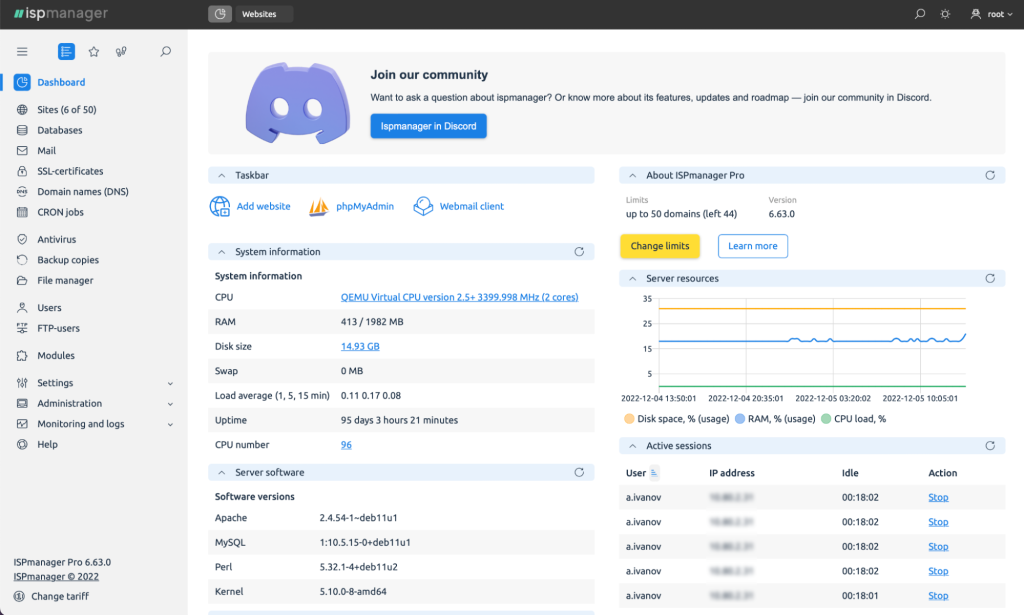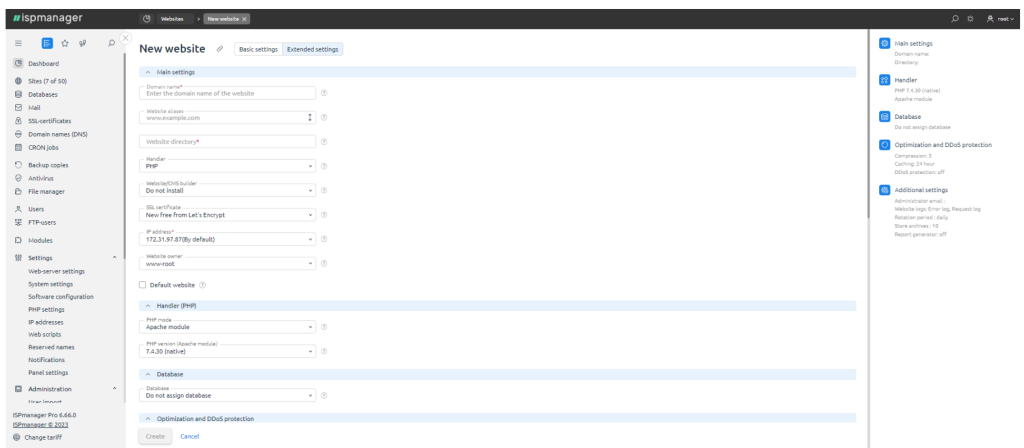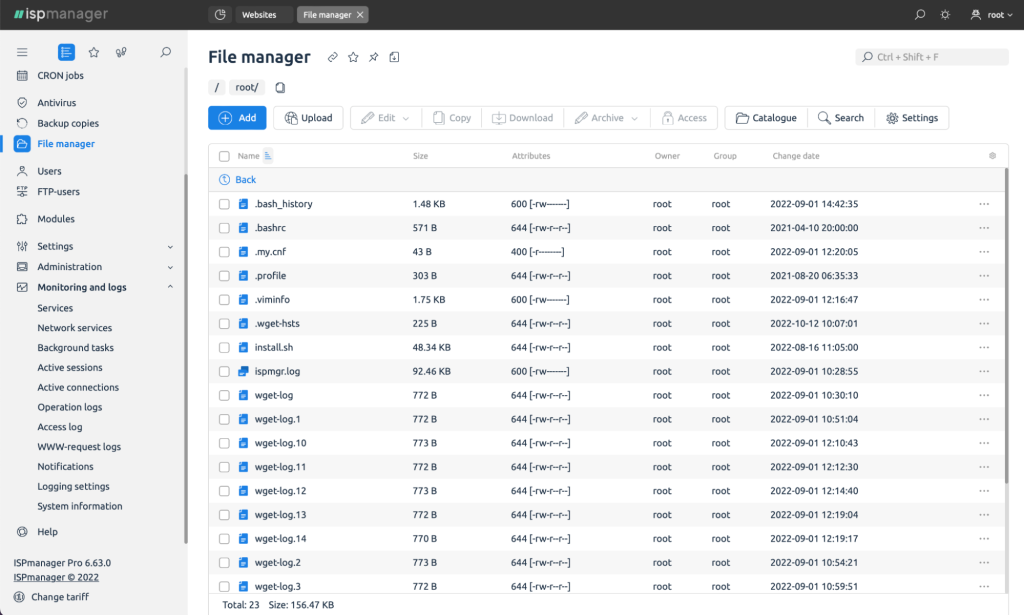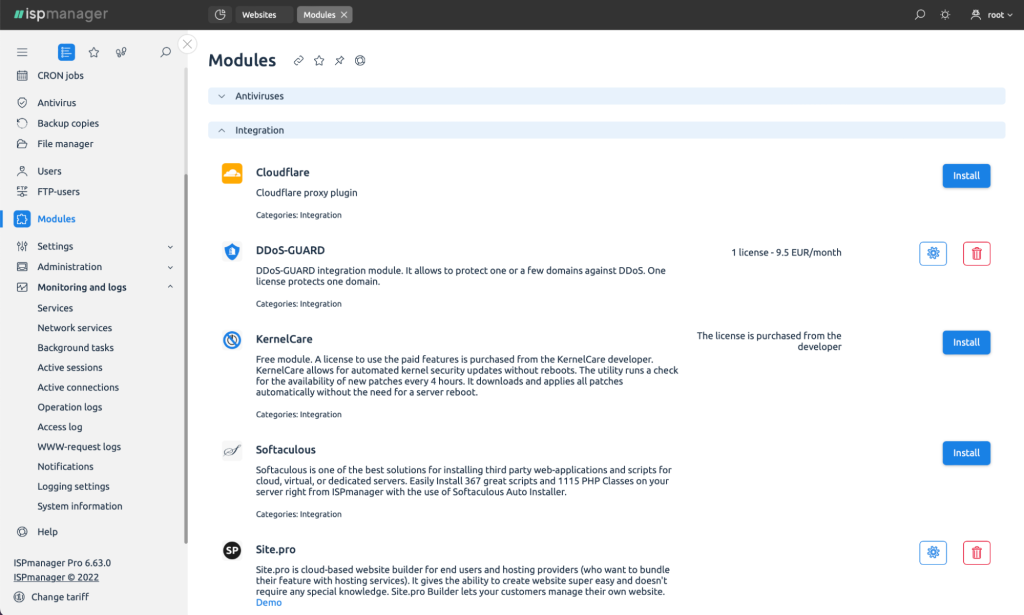In this guide, we will review the main features and capabilities of ispmanager – the control panel for websites and web server. We will also have a look at the interface, the differences between the panel versions, and the information support available to ispmanager users. Please note, that you can choose this control panel when you order any of our virtual servers with Linux distributions.
Introduction to the interface
If for some reason you do not want to work with the server via the console, you can use the graphical interface of ispmanager. It's simple and straightforward, and all the necessary settings for a well-functioning web server are pre-designed and can be easily set in the panel. On the left side of the interface is the main menu, from which you can go to the desired settings: create a site, write to the DNS server, and manage the file manager. You can choose the language of the panel – Russian, English, Belarusian, and Italian languages are supported. Here you can also manage users: create an account for each and individually set the permissions.

The ispmanager dashboard with basic information about the system and server, completed tasks, visits, and much more
The main features of the ispmanager panel
Ispmanager is a commercial web server panel. It allows you to create and manage websites, email, and databases. Let's take a closer look at the panel's functionality.
Creating websites. Using the ispmanager panel you can connect your domain, configure PHP and Node.js, install an SSL certificate and CMS, or create a website using the website builder.

Advanced settings when creating a site
Working with PHP. The ispmanager panel makes working with PHP very easy: there is support for different modes and alternate versions for each host, extensions, and the Composer package manager.
Node.js. The ispmanager panel supports Node.js: you can install different versions and separate applications between users.
DNS server. The panel has its own DNS server, as well as the ability to connect external ones. To protect against phishing, there is support for DNSSEC, an extension that creates a unique digital signature for NS records.
Mail domains. The ispmanager panel supports the management of a mail server on its own domain. Provides a transition to the mail client Roundcube and a large selection of tools to protect against spam and viruses: blacklists, email header analysis, blocking by behavior, and much more.
Databases. Database servers can be created directly from ispmanager. Supported MySQL, MariaDB, PerconaServer, and PostgreSQL. At the same time for each site, you can install its own version of DB and configure user access permissions to the database.
SSL certificates. A significant advantage of ispmanager is support for free SSL certificates from Let's Encrypt. They are automatically installed and renewed. But if your site needs advanced protection, you can add any fee-based certificates to your site.
File manager and FTP. The panel has its own built-in file manager with a code editor, and in addition, you can manage FTP access: create users and assign access permissions.

File manager in ispmanager
Backups. The panel makes backups of user data. It supports storing backups directly on the server and in external storages, including cloud storage.
Modules in ispmanager
In addition to the basic tools, many of which are available in ispmanager, it is possible to connect additional modules that improve functionality. Among them, there are both free and paid modules. Let's take a look at some of them.
Dr.Web is a commercial antivirus module for websites. It scans the system and finds and eliminates threats.
DDoS-guard is a paid module for DDoS protection. Its operation is based on the principle of a reverse proxy server: it passes all traffic through the network of servers and filters harmful traffic. In addition to attack protection itself, the module can work as a CDN (content delivery network), speeding up the download of images, videos, and other media content.
Softaculous is a tool for installing web applications. The module itself is free, but there are paid scripts. The library includes more than 400 scripts and CMS. Through Softaculous you can not only install them but also automatically update them, which is very important for the security and performance of the site.
Site.Pro is a popular module in ispmanager for quickly creating a website based on the website builder. In ispmanager, there is a free version, and you can already make a nice informational site based on one of dozens of templates.

Modules in ispmanager
What is the difference between versions of ispmanager
The ispmanager panel comes in several versions (licenses): lite, pro, host, and business. Let's look at the features and differences in detail.
Ispmanager business is designed for shared hosting. The main difference from other versions is the ability to manage a cluster of servers. This version is often chosen by hosting providers or companies that run multiple web projects.
Lite, pro, host are the popular versions of ispmanager. You can deploy any of them on a single VDS/VPS or a dedicated server. The ispmanager lite, pro, and host versions have different numbers of sites that can be created from the panel.
We've compiled the main differences between the versions in a handy table to make it easier for you to choose the right version.
| Lite | Pro | Host | Business |
|---|---|---|---|
| For web developers and site administrators. You can buy it from a provider or install it on VPS, dedicated servers. | For providers and resellers | ||
| Max 10 domains | Max 50 domains | Unlimited domains | Unlimited domains |
| For one or more projects | For the average number of projects | To support a large number of sites | To set up a business with ispmanager |
In addition, you can read more about the differences in versions in our article: "How to choose the suitable version of the ispmanager panel".
About the developer, updates, and ispmanager documentation
Ispmanager is considered one of the most popular control panels in Russia with an eighteen-year history. It has also been growing in popularity among users in other countries. Its developer is the Russian software company ispmanager.
The first version, ispmanager 4, was released in 2005. The current version — ispmanager 6 — was released in 2021. The software is accredited in the Unified Register of Domestic Software.
Updates for ispmanager are released every two weeks. All new features first appear in the beta branch, then after additional testing - in the stable. The product has an open roadmap — you can see which updates are planned to be released and vote for them.
Ispmanager has full documentation in Russian and English. You can also find unofficial user manuals on the Internet. There is also an official community on Telegram, where you can ask questions to other users and developers.
How to buy ispmanager for VDS/VPS
If you order Linux servers (VPS or dedicated), you can choose any version of ispmanager to suit your particular needs directly in the server order form.
Comments